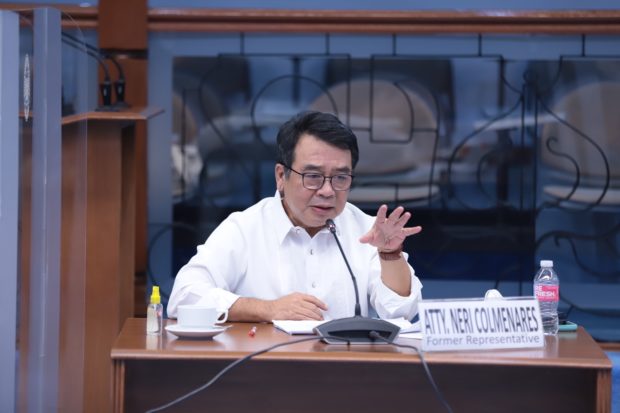Ex-solon warns: Not enough safeguards to avoid corruption in Maharlika Wealth Fund

Human rights lawyer and former Rep. Neri Colmenares (Henzberg Austria/Senate PRIB)
MANILA, Philippines — The proposed Maharlika Wealth Fund (MWF) does not have enough safeguards to protect it from possible abuse and loss of capital, an ex-lawmaker said as a warning to the public and his former colleagues in Congress.
According to former Bayan Muna Rep. Neri Colmenares, the sovereign wealth fund (SWF) under House Bill No. 6398 may be exempted from several regulatory restrictions like reviews by the Office Of The Government Corporate Counsel — exposing the funds to possible corruption.
Colmenares made these observations after attending the hearing of the House of Representatives Committee on banks and financial intermediaries on Monday, where he warned that while the transactions can be audited by the Commission on Audit, corrupt activities would have been conducted already by the time of audit.
“The Maharlika Wealth Fund has no sufficient safeguards, and it is a ‘monster that cannot be controlled. The bill declares that the MWF is exempted from regulatory restrictions such as the Procurement Act, OGCC review of MWF transactions, and many other anti-corruption laws. This opens up the fund to massive corruption,” he said in a statement on Monday.
“Its records are also not accessible to the public as the bill itself admits that records can only be accessed upon approval of the board. MWF is again exempted from freedom of information scrutiny,” he added.
Colmenares, a member of the 16th Congress, also echoed several concerns about the MWF using funds from state insurers, as the proposal would tap into at least P175 billion funds from the Government Service Insurance System (GSIS) and the Social Security System (SSS).
This means the proposed corporation that would manage the MWF would use money from the monthly contributions of public and private sector workers.
READ: Romualdez, other solons call for Maharlika Investment Fund for gov’t investment
“What is worse is that tayo, the funders, ang nag pondo pero hindi natin alam kung paano winawaldas ang ating pera. Genuine accountability and transparency are lost in the Maharlika fund,” Colmenares said.
(What is worse is that we, the funders, would fund this, do not know how the money is being spent. Genuine accountability and transparency are lost in the Maharlika fund.)
“The Maharlika fund is so untransparent that the funds can therefore be spent on irregular transactions or invested to favor certain cronies considering that we are not privy to the investment decisions of the Board. They may swear to high heavens that they will inform us of every investment decision they make but the bill does not say so,” he added.
The Committee on banks and financial intermediaries discusses the proposal filed by House Speaker and Leyte 1st District Rep. Ferdinand Martin Romualdez and other lawmakers.
However, the proposal — a pool of funds that the government can tap to make investments within the country and abroad — has recently earned criticisms as opposition lawmakers and netizens fear that workers’ contributions may be affected in case the state’s investments do not reap a high return.
This has been a contention of Makabayan bloc lawmakers, as they note that as with any investment, there are times when investors lose.
Alliance of Concerned Teachers party-list Rep. France Castro also questioned why the country has a surplus fund when the people are clamoring for social aid and the country has trillions of debt.
READ: Minority solons question need for sovereign wealth fund
Committee on appropriations senior vice chair and Marikina 2nd District Rep. Stella Quimbo — one of the authors of the bill — also assured that state-owned insurers like GSIS and SSS would only invest the amount of money that is excess from what it is scheduled or predicted to disburse for the year.
On Monday, another author in Ilocos Norte 1st District Rep. Ferdinand Alexander Marcos said that they are also seeking to remove politics from the management of the Maharlika Investment Corporation by leaving it to technocrats.